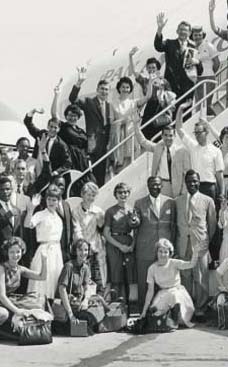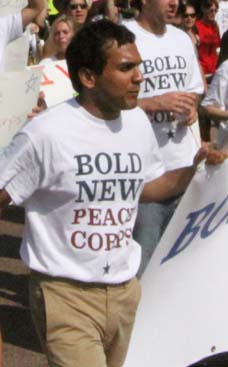
After three years in Paraguay, the subtle notion I had of "me" and "them" has faded. I see the likeness of my small town back home and my small town here. I am somewhere between a visitor and a local - taking away more memories than souvenirs, more questions than answers. I am even prouder of my Aunt Rita putting on the VFW's monthly breakfast, of the way we mesh with our world, and make it incrementally bigger. Although few in my family have passports, they somehow cover more distance - with their ability to see things as someone else might - someone much different than themselves. And so, I acknowledge what was instilled in me well before I lived in another country, by a family that rewards curiosity and never met a stranger. I look out at strangers that welcome me, and living rooms full of people, connected by stories as layered and rich as one of Aunt Rita's casseroles. And, I still feel the warm weight of the globe in my hands.
Mary Dinadr writes: After 27 months with the Peace Corps as a beekeeping volunteer in Paraguay, I didn't want to leave; there was still so much to learn
Coming Home
By MARY CINADR
For The Bulletin
Friday, December 31, 2010
For two years I bathed in a bucket.
That was then, when I lived in a plywood shack in the Paraguayan jungle. I went to the bathroom in a hole in the ground, and wore a beekeeping suit to work.
The children in the community were an endless source of joy, as was my lumbering dog Hank. It was like a fairy tale-a village full of little people, giggling, running in a herd, creating clouds of red dust behind them, guayaba peels dropping at their feet.
After 27 months with the Peace Corps as a beekeeping volunteer, I didn't want to leave; there was still so much to learn. Although my life in the countryside was rewarding, I wanted to see the other side of Paraguay. I applied for an extension of service in the capital city of Asuncion, and began work at an anti-poverty project.
After one month of living in my elfin Asuncion apartment, bathing in a bucket is just a faint memory. I no longer look bewildered in the supermarket, my beekeeping suit stays in my closet, and I speak more Spanish than Guarani, the indigenous language spoken in the countryside.
But, this too, will pass. I yearn for the family and friends that are cut from the same cloth as I am. I miss little things like punctuality, wearing long sleeves, and carpets. And, I crave my Aunt Rita's casseroles.
Can I stay the same person whose company I was able to keep in the jungle for two years? Can I feel the same peace I felt washing my clothes by hand, finding queen bees, reading to children, and shucking corn with neighbors? Can I make writing a daily practice? Can I not start 80 percent of my conversations with, "When I was in Paraguay…"? I know that can get annoying.
When I get back, I want to focus on what's good in the United States. I want to continue believing in abundance. I want to avoid shoulding on myself and others, fountain Diet Coke, being and appearing to be too busy, overconsumption of TJ Maxx items, and the overall desire to have and do more.
It took me 30 years to realize that what I'm supposed to do has little to do with me. Maybe there's some relief in this, but the hard part comes when I start thinking that a higher power has marked a path of crumbs for me - and I can't help but follow it because I love carbs. This path, or impulse, appears to be chock-full of risk. My Paraguayan neighbors are proof that many people with far less material wealth than me, risk far more every day. The fact that I have a roof over my head, the ability to choose a job and feed myself, is…well…ridiculous. If I don't combine my passion and strengths with service to others, I should just sit in the corner and suck my thumb.
Writing and teaching writing makes me feel alive-even more alive than I felt with 60,000 bees around me. What should I make of this? Despite the forced Catholicism that I resisted in my youth, the Bible makes sense to me now. In Corinthians I came across this: "Now you should finish what you started. Let the eagerness you showed in the beginning be matched now by your giving. Give in proportion to what you have." I found more fuel in St. Thomas' words, "If you bring forth what is within you, what you bring forth will save you. If you do not bring forth what is within you, what you do not bring forth will destroy you." Jesus, that's heavy stuff.
It may be difficult to nurture that which makes me feel so alive, as I "Sub n' Serve" (substitute teach during the day, waitress at night). Promoting myself and my small business is a bit daunting, even though I gained confidence in sales selling ad space for a business journal. It was my first non-teaching job. I felt odd at first, in my size 10 heels and monkey suit, driving around in my 2-door Honda, pitching clients on the benefits of a targeted audience. I felt like Chris Farley in the movie "Tommy Boy," selling Callahan brake pads. But, learning to sell will come in handy. I'll bring forth what is within me, even if it means living in an apartment that I can't swing a cat in.
I find myself writing about my family a lot, maybe because I haven't seen them in so long. I come from a place where people who speak Spanish are "Spanish," where the American flag waves in small gardens and truck windows. What we lack in multi-cultural awareness we make up for with local knowledge. We have the second part down of the saying "Think Globally, Act Locally," by participating in sports teams, church, and local government. My grandparents worked the earth and knew it well. They lived with the seasons, gathered scrap metal for airplanes, and saved up for haircuts. There is no shortage of laughter. And many strangers say they feel welcome among us.
The globe lit up the guest room at my Aunt Rita's house, where we piled our coats up on a daybed upon entering her Christmas Eve gathering. I would seek refuge in this room as a child, cracking the window open a bit to suck in some smoke-free air. I would heft the globe, fragile and warm in my hands, and send it gently spinning with eyes closed. Inspired by the "Price is Right" wheel, wherever my pointer finger landed when it stopped is where I would go. My trips were colored by what I saw on PBS; the excitement of flying fed by the small bags of salty peanuts my Dad brought home from his business trips.
At 20, I took my first plane ride…to Quito.
When I returned home clad in reed handbags, Alpaca ponchos and bean necklaces, my brothers teased me. I tried to share the flavors of Ecuador with my parents, whose meals were culturally homogenous aside from sauerkraut and dumplings-the stench of which outlived the leftovers. My friends reluctantly clunked their hips back and forth with me on "Salsa Night" in downtown Albany. I started a lot of conversations with "When I was in Ecuador…" I practiced rolling my r's on my way to work. You could say I over-identified with the experience.
I relived Ecuador serving buckets of Corona while wearing a bowtie and black Easy Spirit sneakers. As a waitress at the Saratoga Race Track, I was happily surrounded by Spanish speakers. I'd arrive early with coffee and ask them to tell me about their hometowns. I would lean in and soak up every detail. In this same way, I'd listen to my Uncle Jerry recount tales of getting lost while driving a 16-wheeler in Chinatown. I substitute taught in Arbor Hill, forming a Spanish Club with a small group of Latino students. I welcomed strangers and tried to be one myself, looking for diversity wherever I could, including the non-relative guests at Aunt Rita's Christmas Eve gatherings. It was then that the power of a story to connect us to deeply profound human experiences dawned on me. Like Samuel in Steinbeck's East of Eden I started to "eat stories like grapes." I imagined being able to look down at a shoebox diorama of the world. I'd lift the roofs off of the tiny houses like lids, and peek inside at the families gathered there.
As I child, going home to my house after a long night at Aunt Rita's was equally enjoyable. I would feel happy to be with a family and to be fed and warm, because I knew so many weren't. The cacophony, cigarette smoke, blasting football game, and competing conversations of Aunt Rita's house may feel as foreign to some as Paraguay used to feel to me. Perhaps home is an ever-changing concept.
After three years in Paraguay, the subtle notion I had of "me" and "them" has faded. I see the likeness of my small town back home and my small town here. I am somewhere between a visitor and a local - taking away more memories than souvenirs, more questions than answers. I am even prouder of my Aunt Rita putting on the VFW's monthly breakfast, of the way we mesh with our world, and make it incrementally bigger. Although few in my family have passports, they somehow cover more distance - with their ability to see things as someone else might - someone much different than themselves. And so, I acknowledge what was instilled in me well before I lived in another country, by a family that rewards curiosity and never met a stranger. I look out at strangers that welcome me, and living rooms full of people, connected by stories as layered and rich as one of Aunt Rita's casseroles. And, I still feel the warm weight of the globe in my hands.
Mary Cinadr got hooked on volunteering after years of preparing Thanksgiving dinner at a soup kitchen. After receiving a master's in liberal studies with a concentration in creative non-fiction from Empire State College, she put her writing business on hold and accepted an invitation to serve in the Peace Corps as a beekeeping extensionist and small business development volunteer in Paraguay. Mary recently returned to the U.S and set up a small business, Circle of Writers, which offers online writing workshops to teens (www.circleofwriters.com). She can be reached at mary.cinadr@gmail.com.















